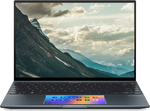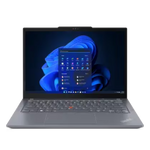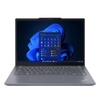A comparison of specs, key information, reviews, and best pricing from top retailers
Last updated -- hours ago | Report incorrect information
What we think

The PerfectRec laptop team Learn more
Updated March 22, 2024·
If you're looking for a laptop that's easier on the wallet and offers a vibrant display for multimedia, the Asus Zenbook 14X OLED is worth considering; however, the ThinkPad X13, while usually more expensive, typically provides robust build quality, better professional features, and a superior keyboard, which might be more suitable for intensive work environments. Keep in mind that the ThinkPad's higher cost often reflects its enterprise-oriented design and features. If your priority is portability and casual use, the Asus could suffice, but for demanding business applications with a need for durability and a business-grade keyboard, the Lenovo may be a better fit. Give Feedback
this description is based on the product variant with some specs and product variant with some specs. At the time of writing, the variant with some specs cost some dollars and the variant with some specs cost some dollars.
Advantages of the ASUS Zenbook 14X OLED
- Very good overall display quality
Advantages of the Lenovo ThinkPad X13
- Very good for general use
- Very good for engineering and design
- Very good for software development
- Very good for content creation
- Very good overall build quality
- Excellent keyboard
Key differences
General Use
7.5


8.4
2880 x 1800
RESOLUTION
1920 x 1200
OLED
DISPLAY TECHNOLOGY
IPS
376.0 nits
DISPLAY BRIGHTNESS
321.0 nits
6.0 Hours
BATTERY LIFE
8.5 Hours
8.0/10
KEYBOARD QUALITY SCORE
9.0/10
8.3/10
PORTABILITY SCORE
8.9/10
The Lenovo ThinkPad X13 is very good for general use, while the ASUS Zenbook 14X OLED is good.
The ASUS Zenbook 14X OLED offers a brilliant screen and solid performance, making it well-suited for everyday tasks and media consumption; however, its portability and battery life may not match the Lenovo ThinkPad X13, which also provides excellent CPU and sufficient RAM for general use, housed in a more travel-friendly design with longer battery endurance, appealing to users frequently on the move. While the ThinkPad's keyboard is renowned for its comfort and precision, both laptops ensure ample storage and manage operating noise and heat effectively, accommodating routine work without major distractions.
Content Creation
7.6


8.2
8.5/10
OVERALL CPU SCORE
8.8/10
2880 x 1800
RESOLUTION
1920 x 1200
8.0 GB
RAM
32.0 GB
OLED
DISPLAY TECHNOLOGY
IPS
The Lenovo ThinkPad X13 is very good for content creation, while the ASUS Zenbook 14X OLED is good.
PerfectRec’s Content Creation Score takes into account the many different features of the laptop that make it more or less suitable for photo editing, video editing and other content creation tasks.
Software Development
7.5


8.1
8.5/10
OVERALL CPU SCORE
8.8/10
8.0 GB
RAM
32.0 GB
2880 x 1800
RESOLUTION
1920 x 1200
8.0/10
KEYBOARD QUALITY SCORE
9.0/10
The Lenovo ThinkPad X13 is very good for software development, while the ASUS Zenbook 14X OLED is good.
PerfectRec’s Software Development Score takes into account the many different features of the laptop that make it more or less suitable for software developers.
Screen Quality
8.6


6.9
14.0in
SIZE
13.3in
2880 x 1800
RESOLUTION
1920 x 1200
OLED
DISPLAY TECHNOLOGY
IPS
120Hz
REFRESH RATE
60Hz
376.0 nits
BRIGHTNESS
321.0 nits
The ASUS Zenbook 14X OLED has a better screen than the Lenovo ThinkPad X13 for general use, gaming and AI, and engineering and design, while the Lenovo ThinkPad X13 has a better screen for content creation, and software development.
For general use, the Zenbook’s OLED panel offers vibrant colors and deep blacks with higher resolution and brightness, enhancing visual comfort and detail, whereas the ThinkPad's screen is slightly less impressive but still offers clarity and brightness suitable for everyday tasks. In engineering and design, the Zenbook's wider color gamuts provide more accurate color representation for professional work, but the ThinkPad, while still offering good color accuracy, falls a bit short for color-critical tasks. When it comes to gaming and 3D applications, the Zenbook's screen falls behind due to lower refresh rates, making it less smooth for fast-paced visuals, while the ThinkPad also struggles with similar refresh rate limitations, meaning both are not ideal for high-end gaming or 3D rendering.
Battery
6.0 Hours


8.5 Hours
The ASUS Zenbook 14X OLED has 6 hours of battery life. The Lenovo ThinkPad X13 has 8.5 hours of battery life.
Battery life estimate is based on a mix of common use patterns. More portable and higher performing laptops tend to have less battery life.
Portability
Very Good


Very Good
14.0in
SIZE
13.3in
3.4 lbs
WEIGHT
2.8 lbs
0.6in
THICKNESS
0.6in
The Lenovo ThinkPad X13 and ASUS Zenbook 14X OLED both have very good portability, though the Lenovo ThinkPad X13 has somewhat better portability.
The most portable laptops are small, thin, and light.
Build Quality
7.8


8.5
The Lenovo ThinkPad X13 has very good build quality, while the ASUS Zenbook 14X OLED has good build quality.
PerfectRec’s Build Quality Score incorporates case materials, display and keyboard flex, hinge quality, and overall reliability.
Cost
$825


$948
$400
$600
$800
$1,000
$1,200
$1,400
The ASUS Zenbook 14X OLED has a price of $825 and the Lenovo ThinkPad X13 costs $948.

Let Us Help Find Your Perfect Laptop
Find your new laptop
Key similarities
Gaming and AI
6.5


6.7
3.7/10
OVERALL GPU SCORE
4.0/10
2880 x 1800
RESOLUTION
1920 x 1200
120Hz
REFRESH RATE
60Hz
No
SUPPORTS DLSS
No
No
MUX SWITCH / ADVANCED OPTIMUS
No
6.5/10
FAN NOISE SCORE
7.5/10
The Lenovo ThinkPad X13 and ASUS Zenbook 14X OLED are both only fair for gaming and AI.
The ASUS Zenbook 14X OLED offers a vivid OLED display which is great for screen quality, but it might not have a high refresh rate or powerful enough GPU for the best gaming and 3D performance. The Lenovo ThinkPad X13, while robust in CPU performance for everyday tasks, may also fall short in GPU and screen refresh rate, making it less ideal for the demands of high-end gaming and intense 3D applications.
Engineering and Design
7.7


8.0
8.5/10
OVERALL CPU SCORE
8.8/10
3.7/10
OVERALL GPU SCORE
4.0/10
8.0 GB
RAM
32.0 GB
Although they have very similar scores, PerfectRec considers Lenovo ThinkPad X13 to be very good for engineering and design, while the ASUS Zenbook 14X OLED is good.
The ASUS Zenbook 14X OLED, with its superior GPU and high-quality OLED screen, excels in graphics-intensive tasks and provides vibrant visuals for design work, whereas the Lenovo ThinkPad X13, while not as powerful in graphics, compensates with an excellent keyboard and build quality that appeal to engineers who prioritize typing comfort and durability, along with easy portability for on-the-go use. Both laptops offer robust CPUs and sufficient RAM to handle demanding engineering software, ensuring smooth multitasking and performance.
Give feedback
We’re constantly working to improve.
How the ASUS Zenbook 14X OLED and the Lenovo ThinkPad X13 compare to other laptops
Spec Comparison
| ASUS Zenbook 14X OLED | Lenovo ThinkPad X13 |
GENERAL | |||
|---|---|---|---|
| Price | |||
$825 | $948 | ||
Release Date | |||
Release Date | May 1, 2023 | September 1, 2023 | |
Overall Dimensions | |||
Overall Dimensions | 12.7'' x 8.9'' x 0.67'' | 11.9'' x 8.5'' x 0.63'' | |
Weight | |||
Weight | 3.44 lbs | 2.87 lbs | |
Width | |||
Width | 12.67" | 11.88" | |
Depth | |||
Depth | 8.88" | 8.46" | |
INTERNAL | |||
|---|---|---|---|
Processor | |||
Processor | Intel i5-13500H | AMD Ryzen 7 7840U | |
RAM | |||
RAM | 8 GB | 32 GB | |
DDR Memory Version | |||
DDR Memory Version | 5 | 5 | |
RAM Slots | |||
RAM Slots | 0 | 0 | |
Storage | |||
Storage | 512 GB | 1024 GB | |
BATTERY | |||
|---|---|---|---|
Battery Life | |||
Battery Life | 6 Hours | 8.5 Hours | |
Battery Capacity | |||
Battery Capacity | 70 Wh | 41 Wh | |
SCREEN | |||
|---|---|---|---|
Diagonal Size | |||
Diagonal Size | 14" | 13.3" | |
Display Technology | |||
Display Technology | OLED | IPS | |
Resolution | |||
Resolution | 2880 x 1800 | 1920 x 1200 | |
Refresh Rate | |||
Refresh Rate | 120Hz | 60Hz | |
Display Brightness | |||
Display Brightness | 376 nits | 321 nits | |
RELIABILITY, APPEARANCE & ACOUSTICS | |||
|---|---|---|---|
Build Quality Score | |||
Build Quality Score | 7.8/10 | 8.5/10 | |
Portability Score | |||
Portability Score | 8.3/10 | 8.9/10 | |
Gaming Laptop Appearance | |||
Gaming Laptop Appearance | No | No | |
Premium Business Laptop | |||
Premium Business Laptop | No | Yes | |
Fan Noise Score | |||
Fan Noise Score | 6.5/10 | 7.5/10 | |
HARDWARE FEATURES | |||
|---|---|---|---|
Keyboard Quality Score | |||
Keyboard Quality Score | 8/10 | 9/10 | |
Speaker Quality Score | |||
Speaker Quality Score | 7.5/10 | 7.5/10 | |
Webcam | |||
Webcam | 1080p | 1440p | |
Fingerprint Reader | |||
Fingerprint Reader | No | Yes | |
Backlit Keyboard | |||
Backlit Keyboard | Yes | Yes | |
Number Pad | |||
Number Pad | Yes | No | |
CONNECTIVITY | |||
|---|---|---|---|
USB Type-A | |||
USB Type-A | 1 | 2 | |
USB-C ports | |||
USB-C ports | 2 | 2 | |
USB-C Charging | |||
USB-C Charging | Yes | Yes | |
Display Outputs | |||
Display Outputs | 3 | 3 | |
Thunderbolt Version | |||
Thunderbolt Version | 4 | N/A | |
Shopping
ASUS Zenbook 14X OLED
See more
Dig into reviews and images
PCMag
Matthew Buzzi | September 2023
"While one of the more budget-friendly configurations of the Asus Zenbook 14X OLED may make a compelling case as a top value pick, it’s difficult to be disappointed with the more expensive model we reviewed here. At its core, for all models, it’s a luxury-built laptop with extreme portability and a gorgeous OLED display. Our unit rocks with a snappy Core i9 processor for getting real work done, and the discrete GPU—even if it has a clear power ceiling—is a bonus for creative pros."
Lenovo ThinkPad X13
See more
Dig into reviews and images
NotebookCheck
Benjamin Herzig | September 2023
"The Lenovo ThinkPad X13 G4 has very good input devices, a wide array of security features and ports as well as 5G in the tested configuration. It is more compact and lightweight compared with its predecessor, and it has improved speakers and a slightly better webcam. On the other hand, the fan is more annoying and the performance is barely improved. The battery is worse as well, but this is primarily attributable to the OLED screen - if this aspect is important, buyers should choose the IPS Low Power LCD."
Get a great deal on the ASUS Zenbook 14X OLED or the Lenovo ThinkPad X13
About ASUS
ASUS, a Taiwanese electronics brand, is one of the largest personal computer vendor by market share. The majority of their laptops are targeted towards personal use or gaming. Their most popular product lines include the budget-friendly VivoBook, more premium ZenBook, and their TUF and ROG gaming laptops, the latter of which has a reputation for excellent gaming performance.
About Lenovo
Lenovo is a Chinese technology company, and one of the largest personal computer vendor. They are well known for a variety of technology products, including laptops. Their consumer series include their entry level IdeaPad and LOQ series and mid-to-high-end Yoga and Legion series. On the business-oriented side, their series include their entry-level ThinkBook series and mid-to-high-end ThinkPad series. Lenovo laptops offer strong performance for reasonable prices, and are often on sale.
Give feedback
We're constantly perfecting our model
Laptop guides you might be interested in
More comparisons for you
Compare ASUS Zenbook 14X OLED vs. Lenovo IdeaPad Slim 5i
VS
Compare ASUS Zenbook 14X OLED vs. Acer Swift X (2021)
VS
Compare ASUS Zenbook 14X OLED vs. Gigabyte A5
VS
Compare Lenovo ThinkPad X13 vs. MSI Katana 15
VS
Compare Lenovo ThinkPad X13 vs. Dell Latitude 5431
VS
Compare Lenovo ThinkPad X13 vs. Gigabyte G5
VS
FAQs
FAQs about laptops
Why trust us
This information was produced and vetted by the PerfectRec laptops team. We are a product research and recommendation organization that meticulously reviews and evaluates the latest laptop information and makes it digestible for you.
By the numbers
380
Laptops evaluated
48,640
Laptops stats compiled
13
Proprietary Laptops ratings developed
110,895
Recommendations made
24,028
Consumer hours saved
About the laptop team
Joe Golden, Ph.D
CEO and Laptops Editor
Joe is an entrepreneur and lifelong electronics enthusiast with a Ph.D in Economics from the University of Michigan.
Jason Lew
Staff Expert & Software Engineer
Jason is a staff expert and software engineer that has been making laptop recommendations for 7 years and moderates one of the largest laptop subreddits.
Chandradeep Chowdhury
Staff Expert & Software Engineer
Chandradeep is a staff expert and software engineer and expert in televisions and monitors. He’s been making monitor recommendations for ten years.
Craig Russell
Laptops Expert
Craig is a UK-based laptops expert. Craig works in IT, where he recommends and supports laptops and PCs for clients and has been recommending laptops on Reddit for five years.







